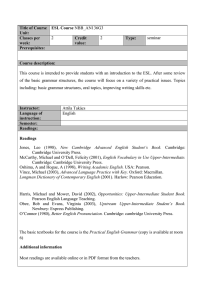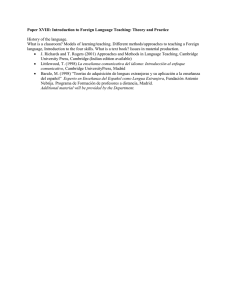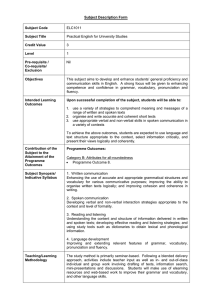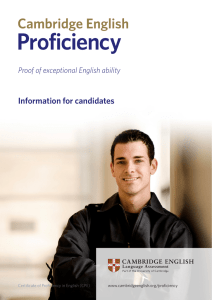Information for candidates
Anuncio
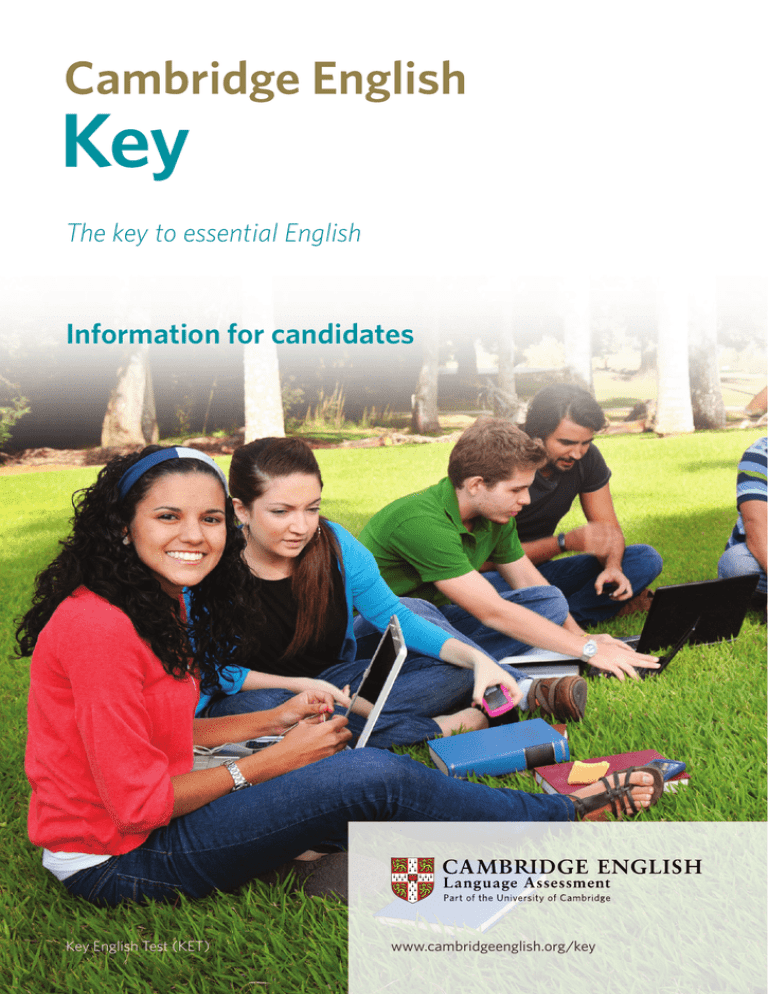
The key to essential English Information for candidates Key English Test (KET) www.cambridgeenglish.org/key How to use this guide You can print this document if you wish, but it is better to read it on screen. Click the links in the document to access other useful online resources such as videos and practice tests, and to find the information you need. About the exam Preparing Exam day After the exam What is Cambridge English: Key? Cambridge English: Key, also known as Key English Test (KET), is a test at A2 level of the Common European Framework of Reference for Languages (CEFR). The test has exactly the same types of tasks and questions as Cambridge English: Key for Schools. Both tests use English in everyday situations. The only difference is that Cambridge English: Key is for people who have left school and may be working. You can do Cambridge English: Key as a paper-based or computer-based test. About the exam Here’s a summary of what’s in the exam: Paper details What’s in the paper? What do I need to be able to do? Reading and Writing The Reading and Writing paper has nine parts and the tasks include: Some of the things you need to be able to do are: • matching sentences to notices • read and choose the correct word 1 hour 10 minutes • multiple-choice questions on a text • multiple-choice responses to something someone says • a multiple-matching question • a spelling task • an open-cloze task (a text with gaps – you need to fill in the gaps) • an information-transfer task • a guided writing task. • understand real-world notices • read and choose the correct answer • put a conversation in the correct order • spell words correctly • choose the correct words to complete a text • complete an email/letter with missing words • complete a form with important information • write a short note, email or postcard. 2 Paper details What’s in the paper? What do I need to be able to do? Listening The Listening paper has five parts and the tasks include: You need to be able to: About 30 minutes • answering multiple-choice questions on short listening texts • matching a list of nouns to people while listening Exam day After the exam • listen and write down important information and spell words correctly. • answering multiple-choice questions on a conversation About the exam Preparing • listen for important information in short and long conversations and monologues • filling in missing words on a form while listening to one or two people speaking. Speaking About 8–10 minutes The Speaking test has two parts. In the first part the interlocutor asks the candidate ‘getting to know you’ type questions; in the second part candidates talk to each other to get/give some information. You need to be able to: • answer questions about yourself • read a card and ask your partner some questions to get missing information • read a card and answer your partner’s questions. You don’t need to pass all three papers to pass the whole exam. For example, if you do very well in Reading and Writing and Listening, but you don’t do so well in Speaking, it is still possible to pass the exam. The Reading and Writing paper tests two skills so the weighting for this paper is doubled. xxDownload a complete sample paper. xxTry a computer-based practice test. (Please note you will need to use the Firefox or Chrome browser to view these sample tests.) xxWatch a video of a Speaking test. 3 Before the exam – preparation It is good to do practice tests and try to improve your grammar and vocabulary, but remember that the most important thing is that you can communicate clearly. So, for example, in the Speaking test, the examiner will be interested in how you ask your partner questions and how you give information to your partner as well as the grammar and vocabulary you use. About the exam Preparing Exam day To help you get ready for Cambridge English: Key, our website has a lot of free exam material available, including: • tips and FAQs for each exam paper • sample papers and a computer-based practice test • links to further books for study. You can also buy official preparation materials, including coursebooks and practice tests, to help you prepare. After the exam How much do you know about preparing for Cambridge English: Key? Can you answer these questions? 1. What do I have to do in each part of the test? 2. How important are practice tests? 3. What kinds of things should I read? 4. How can I improve my writing skills? 5. How can I learn to use more vocabulary and grammar? 6. How can I improve my listening skills? 7. What is the best way to improve my speaking skills? Find the answers on the next page 4 ANSWERS Preparing for Cambridge English: Key 1. What do I have to do in each part of the test? About the exam Preparing Exam day After the exam You can download a sample paper and find more information about each part of the test on the Cambridge English Language Assessment website. If you are taking a computer-based exam, you can try a computer-based practice test here. 2. How important are practice tests? It is very useful to do some practice tests, so you will know exactly what is in the test. It is also important to practise doing a timed test. When you have finished, look at the answers and think carefully about the ones that are wrong and why they are wrong. After you have done the Writing part, look at the sample answers. You could also do a practice Speaking test with a friend. Remember, doing practice tests is only part of the work you need to do to get ready for the exam. Think about what you are good at and not so good at when you use English. Try to improve your English, not just for the exam but for life after the exam! 5 3. What kinds of things should I read? The Reading paper contains different kinds of texts so try to look at texts that you can find around you or on the internet, not just in your coursebook. Some things that would be useful to look at include: • signs, notices and advertisements • short newspaper and magazine articles About the exam • notes, text messages and emails from friends • posters and leaflets (you may be able to find leaflets in English in the library or in a tourist information office) • graded readers (books that are written for people learning English). Preparing Exam day After the exam The Reading paper tests reading in different ways, so prepare yourself for this. For example: • try to read a text quickly to get the main idea (this is called ‘skimming’) • read a text to find out certain information, for example, reading a TV guide to find out if there is a type of programme on today (this is called ‘scanning’) • try to read some texts carefully so that you understand everything. You will need to read in all of these different ways in the Reading test so if you can practise like this it will really help you. Another useful thing you can do when you are reading is try to guess the meaning of a word that you don’t know in a sentence. 6 4. How can I improve my writing skills? Some useful ways of preparing for the Writing parts are: • Write short messages or emails to friends and encourage them to write back to you. • Try to learn how to do things in your writing like giving information, inviting, suggesting, thanking and apologising. About the exam Preparing • Practise writing a message (Part 9 of the test) that is 25–35 words long so that you have a good idea of what that many words looks like. • When practising answering exam questions, try not to use the words that are in the question; use your own words instead. • Look at model answers in coursebooks to see what answers are like at A2 level. This will help you to see what a ‘good’ answer looks like. • Practise writing with the same time limit as in the exam. Exam day • Practise copying information from posters or leaflets then check your spelling. (This will help with Part 8 of the Reading and Writing paper.) After the exam In Part 9, there are always three parts of the message that you must include. The examiner will check that you have included all of these three parts. They will also look at how clear and easy to understand your writing is. Your writing should not have too many spelling, grammar and vocabulary mistakes. 5. How can I learn to use more vocabulary and grammar? Try to do the following: • Keep a vocabulary book and write down new words that you see in past papers and your coursebook. Try to write words that go together so that you can learn these, e.g. ‘do your homework’ and ‘make a noise’. • Practise your spelling. If you have problems spelling a word, try to practise writing it again and again until you can remember the correct spelling. • Play the Cambridge English games Funland and Monkey Puzzles – a fun way to learn and practise vocabulary. • Look at the Cambridge English: Key vocabulary list. If you look at the list, you can see which areas you need to practise. • Learn the different forms of irregular verbs (like ‘I run’, ‘I ran’, ‘I have run’). 7 6. How can I improve my listening skills? Try listening to real people speaking as much as you can. You can find many different things to listen to online and you may find it easier to watch videos so that you can see the person speaking at the same time as listening to them. You could listen to: • videos on the Cambridge English TV YouTube channel • the recordings in the balloon burst game in Funland About the exam • sample chapters from Cambridge Univeristy Press graded readers • a drama called The Flatmates on the BBC website (you can find worksheets to go with this too). Preparing 7. What is the best way to improve my speaking skills? Exam day The best thing to do is to speak English as much as you can with your friends and your teacher. Try to talk about different things. Practise asking questions – think about the information you want to find out and ask a question to get that information. You could look at an advert or poster with a friend and ask each other questions about it. This will help you with Part 2 of the Speaking test. After the exam 8 What do you know about practical things to do before the exam? Can you answer these questions? About the exam Preparing Exam day 1. How can I find practice tests? 2. When will my exam be? 3. What is the Notice to Candidates? 4. What do I need to take with me on exam day? 5. How do I register for results online? Find the answers on the next page After the exam When you learn a language it’s very important that it’s structured. The exams offer you a step-by-step approach. Patrick Fryzlewicz, Poland 9 ANSWERS Practical things to do before the exam 1. How can I find practice tests? About the exam Cambridge English books of practice tests are available online or from bookshops. There are also free sample tests on our website. 2. When will my exam be? Preparing Ask your teacher. If your language school or college does not register students for the exam, your teacher or parents can find an exam centre near you using our website. Exam day 3. What is the Notice to Candidates? After the exam It is a list of things you can and can’t do in the exam room. Your exam centre will give you a Notice to Candidates, but you can also see a copy online. 4. What do I need to take with me on exam day? It is important to take your passport for identification. A bottle of water is also a good idea. You can take pens and pencils, but your centre will give you these if you don’t have any. 5. How do I register for results online? When you register for the exam, you will receive a Confirmation of Entry. This will show the web address for our Results Online site, as well as your ID number and secret number, which you will need to use to register to receive your results online. It’s a good idea to register a few weeks before your exam – we may send you useful information by email. 10 Exam day Here are some things that will happen on exam day: • You may be given a sheet of candidate data to fill in. Don’t worry – this is just information for us at Cambridge English Language Assessment. About the exam Preparing Exam day • When you do the exam, it is very important that you know how to fill in the answer sheets. Doing practice tests and the online sample test will help you to do this on the exam day. • For the Speaking exam, you will go in with a partner and there will be two examiners: the interlocutor, who will ask you questions and give you a global mark, and the assessor, who will just listen and give you marks by using assessment criteria. • If you have registered for the exam yourself (not through a school), you can contact your local centre with any questions. You can find your local centre here. • Before you take your exam, visit the What to expect on exam day web page and read the Summary Regulations for Candidates. After the exam 11 33 Make sure you have a good night’s sleep before exam day. 33 With Reading, look carefully at the instructions for each text and the titles of the longer texts. The instructions will tell you what to do and the titles will tell you where the text comes from and what it is about. Read the texts carefully and make sure that you answer the questions (don’t just choose an answer because you see one word). About the exam Preparing 33 For the Writing part of the paper (Parts 6–9), check your spelling carefully and make sure you write down words correctly in Part 8; in Part 9, check that you have included all three points from the question. Give yourself time to write, check and edit your work. If you do change anything, make sure your writing is easy to read. Exam day After the exam EXAM DAY TIPS 33 In the Listening paper you will hear each recording twice. Use any pauses to read the instructions and questions. Try to answer questions the first time you hear the recording and then use the second time to check your work and fill in any answers that you didn’t hear the first time. At the end of the test, copy your answers carefully onto the answer sheet and check your work. 33 On all the papers make sure that you have chosen an answer for each multiple-choice question. 33 With Speaking, listen to what the interlocutor says and what your partner says. Try to answer the examiner’s questions with more than one word. In Part 2, try to make correct questions using the question words, but don’t worry if you think you have made a mistake. The important thing is that you communicate well with your partner and the examiner. 12 After the exam – your results and the things you can do next What should you do after the exam? About the exam Can you answer these questions? 1. How long do I have to wait for my results and my certificate? 2. What information will be on my Statement of Results? Preparing 3. What is the online Results Verification Service? 4. What does my overall score say about my level? Exam day After the exam 5. What can I do with my Cambridge English: Key qualification? 6. How can I continue my language learning after passing Cambridge English: Key? Find the answers on the next page 13 ANSWERS Results and next steps 1. How long do I have to wait for my results and my certificate? About the exam Preparing Exam day After the exam Statements of Results are usually available four to six weeks after the test for paper-based exams, and two to three weeks after the test for computer-based exams, and you can see your results online. To do this, put in your candidate ID number and secret number. These can be found on the Confirmation of Entry sheet that your centre gave you. We will send your certificate about three weeks after the results are available. 2. What information will be on my Statement of Results? On your Statement of Results you’ll see your: • score on the Cambridge English Scale for each of the three papers (Reading and Writing, Listening and Speaking) • score on the Cambridge English Scale for the overall exam • result for the overall exam • CEFR level for the overall exam. Please see Understanding your Statement of Results. 14 3. What is the online Results Verification Service? This service lets universities, colleges or employers check your exam result. You will need to give them your candidate ID number and secret number. 4. What does my overall score say about my level? Preparing Exam day After the exam If you achieve a score between 120 and 139 (Pass with Merit or Pass) in the exam, you will receive the Key English Test certificate at Level A2. If your performance is below A2 level, but within A1 level, you will get a Cambridge English certificate stating that you showed ability at Level A1. 5. What can I do with my Cambridge English: Key qualification? The certificate that you receive shows you have mastered the basics in English. This certificate is accepted by thousands of leading businesses and educational institutions worldwide. Find out more about who accepts Cambridge English exams here. 6. How can I continue my language learning after passing Cambridge English: Key? After you have passed Cambridge English: Key, you can go on to take Cambridge English: Preliminary (B1 level) and following that you could also take Cambridge English: First, which is at B2 level, and Cambridge English: Advanced at C1 level. You can see all of the Cambridge English exams here. © UCLES 2016 | CE/4311a/6Y04 About the exam Your overall score for the exam is given on the Cambridge English Scale and shows how well you did in the exam. If you achieve a score of between 140 and 150 (Pass with Distinction), this means you performed exceptionally well and that your English is above A2 level, the level of Cambridge English: Key. Your certificate will state that you showed ability at Level B1 in the Key English Test. Cambridge English Language Assessment 1 Hills Road Cambridge CB1 2EU United Kingdom www.cambridgeenglish.org/helpdesk All information correct at the time of going to print in April 2016. 15
